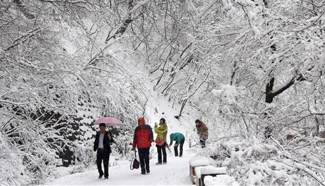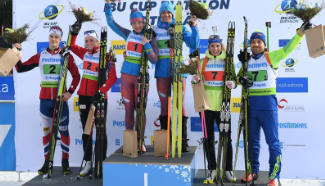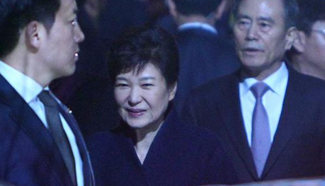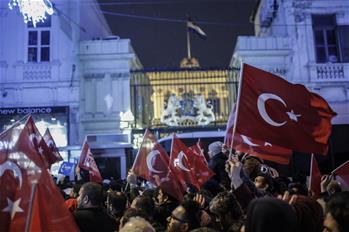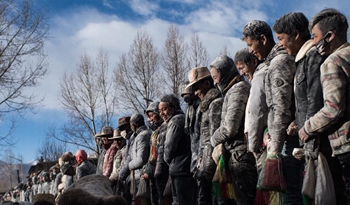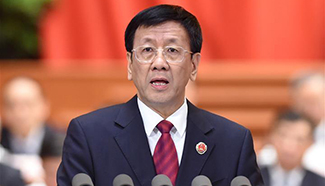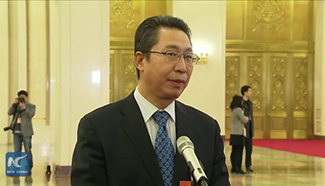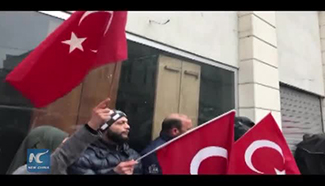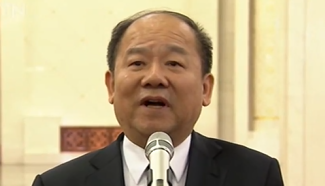by Xinhua writers Gan Chun, Liu Fang
VENLO, Netherlands, March 13 (Xinhua) -- "Yes, I will vote for him," Jo, a 40-year-old business owner, did not hesitate to voice his support for Dutch far-right populist Geert Wilders, but was reluctant to speak in front of the camera and even refused to reveal his surname.
"There are things about Mr. Wilders' proposals that interest me. I'd say we'll give him a chance," he said, standing in front of his well-equipped garage in a suburban district of Venlo, a small city in the southeast corner of the Netherlands.
Dozens of meters away from Jo's garage, a grocery vendor at the local farmers' market who identified himself only as Cuan shared the same feelings.
"I am sure Wilders will win big. Let's really try something different. What is there to fear?" said Cuan, who voted for the liberal People's Party for Freedom and Democracy (VVD) of current Prime Minister Mark Rutte in the last election, but now regrets it.
"I work every day except Sunday. My life is not better. It's they who have better lives in big cities, in big companies," he grumbled.
Located on the west side of the Maas River, the district has a rather desolate vibe compared to the bustling city center on the east, with similar low-rise apartment buildings and a large proportion of senior residents.
Like Jo and Cuan, around 20 percent of the voters living in this neighborhood are rooting for Wilders, the leader and only member of the far-right Party for Freedom (PVV), but not many are willing to show their support publicly, even though Venlo is his birthplace.
DIVIDED HOMETOWN
Situated a few kilometers away from the German border, Venlo, with a population of 100,000, of which several thousands are immigrants, was one of the average towns in the Netherlands that would not normally interest outsiders, until its most famous native became the leading exponent of populism in a country known for its tolerance and diversity.
Wilders kicked off his campaign in mid-February by making the notorious "scum" comment about Moroccan migrants, and has vowed to shut down mosques and pull the Netherlands away from the European Union (EU), or as he puts it -- "make the Netherlands ours again."
Although his anti-EU and anti-Islam remarks have sparked heated controversy both at home and abroad, Wilders is riding high in opinion polls in the final run-up to the March 15 election.
According to latest polls, this one-member party could garner 15.7 percent of the votes from the Netherlands' 12.7 million voters, making this smallest party the country's second largest party.
The southern province of Limburg, where Venlo is located, is one of the PVV's strongholds, but just like anywhere else in the Netherlands, opinions are widely divided.@ Opponents of Wilders often point to the fact that he is good at inciting sentiments but offers no concrete plans.
"I don't support Wilders, because he has no solution to immigration, only a statement," said Peter Hurkmans, a local resident. "The things he says are not decent. You have to respect people."
Meanwhile, the city of Venlo is trying to convince journalists who come here digging for scoops that it does not share a strong bond with Wilders.
"It is fun for people to come here and ask for Wilders' story. Wilders really does not affect what we are doing here," said Ruud Stikkelbroeck, managing director of Venlo Partners, the marketing organization for the city.
His colleague, Jan Brouwers, 66, said that he lived in the same street where Wilders lived, but had never seen him. "He really doesn't live in Venlo. He was born here. That's all."
"There are some bad things, but you don't have to use a telescope to look at that. That is what Wilders does. He is always using a telescope to look at the small bad things. And then he shouts," said Stikkelbroeck.
"It's not about screaming. It's about solution," Brouwers agreed.
FAR-RIGHT SUPPORTERS' PSYCHOLOGY
Speaking out against migrants, from both inside and outside the EU, has been one of Wilders' most efficient strategies throughout his campaign.
"I hired migrants before, but I'm sorry to say that we didn't get along. One of them even threatened me," said Jo, who stressed that he's not against immigration but the government should take stronger control of its borders.
Ed Gerritsma, owner of a fish booth in Venlo and one of the few people in his neighborhood who are not afraid of openly supporting the PVV, said that he is not against migrants or refugees, but the country needs no "lazy people."
"When people have problems, they come to Europe to get help. That's good. But many people come to Holland, they don't work, but get everything -- television, bicycle, home. We work the most, but we need to buy those things, even with more money," he complained.
That's a sentiment quite common among Wilders supporters, but immigration is not really the cause, according to Tom Zwart, a professor of human rights at Utrecht University.
"Many Wilders voters felt left out by the political system and by globalization. Wilders was one of the first to reach out to them and to take their concerns seriously," said Zwart.
"Wilders' supporters are critical of Muslims not because they hate Muslims, but because they have a poor image of themselves -- they lack self-worth," he analyzed from a perspective of social psychology. "They do not hate others, but doubt themselves."
The professor said that Dutch politicians had failed to invest in opportunities for Wilders supporters to help them start "believing in themselves again."
According to Eddy Habben Jansen, an election expert, some PVV supporters are voting for the party as a "warning" to politicians who failed to listen to them.
POST-ELECTION PROSPECTS
The upcoming Dutch parliamentary election sees a total of 28 parties bidding for 150 seats at the lower house. One week before the voting day, Peilingwijzer, a polling indicator that combines different polls, showed that the VVD (24-28 seats) and the PVV (21-25 seats) are locked in a neck-and-neck battle.
It is the first of a series of high-stake elections across Europe this year, to be followed by the ones in France, Germany and possibly Italy.
The results could be a touchstone of the power of the growing populism in Europe to see whether it has gained sufficient support among these core EU members to change the bloc's political landscape.
Due to the fragmented nature of Dutch politics, no party has ever won a majority in the lower house, making coalitions inevitable, but all major parties have ruled out working with Wilders.
It means that even if the PVV wins or comes second, Wilders would be blocked from governing, let alone becoming prime minister.
But any of his electoral gains would further complicate the Dutch political life, warned Barend ter Haar, a senior visiting research fellow at the Netherlands Institute of International Relations.
Mainstream parties are tempted to sing the tune of pro-populist groups as they comprise a sizable part of the electorate, he explained, urging Dutch politicians and common people not to be "short-sighted."
"Opening-up and cooperation are the right way," he said.

